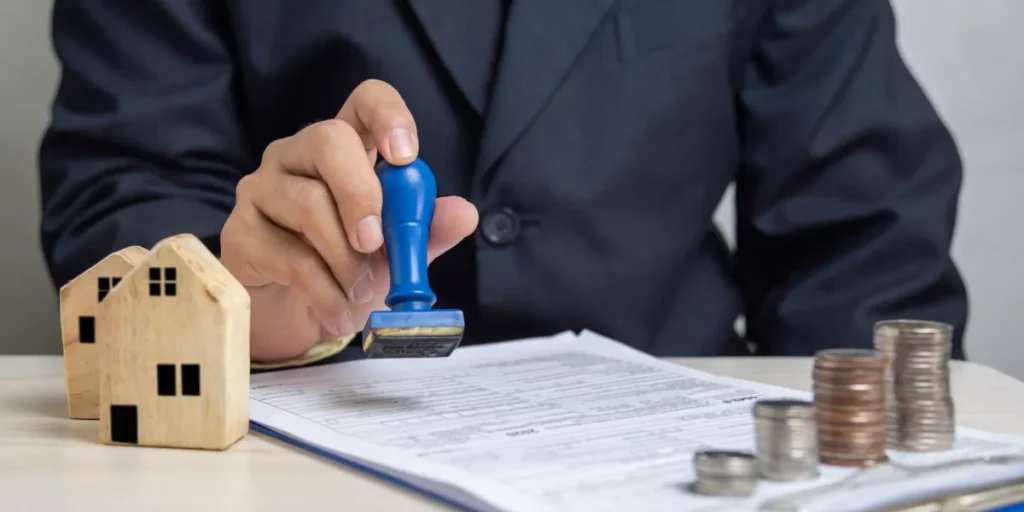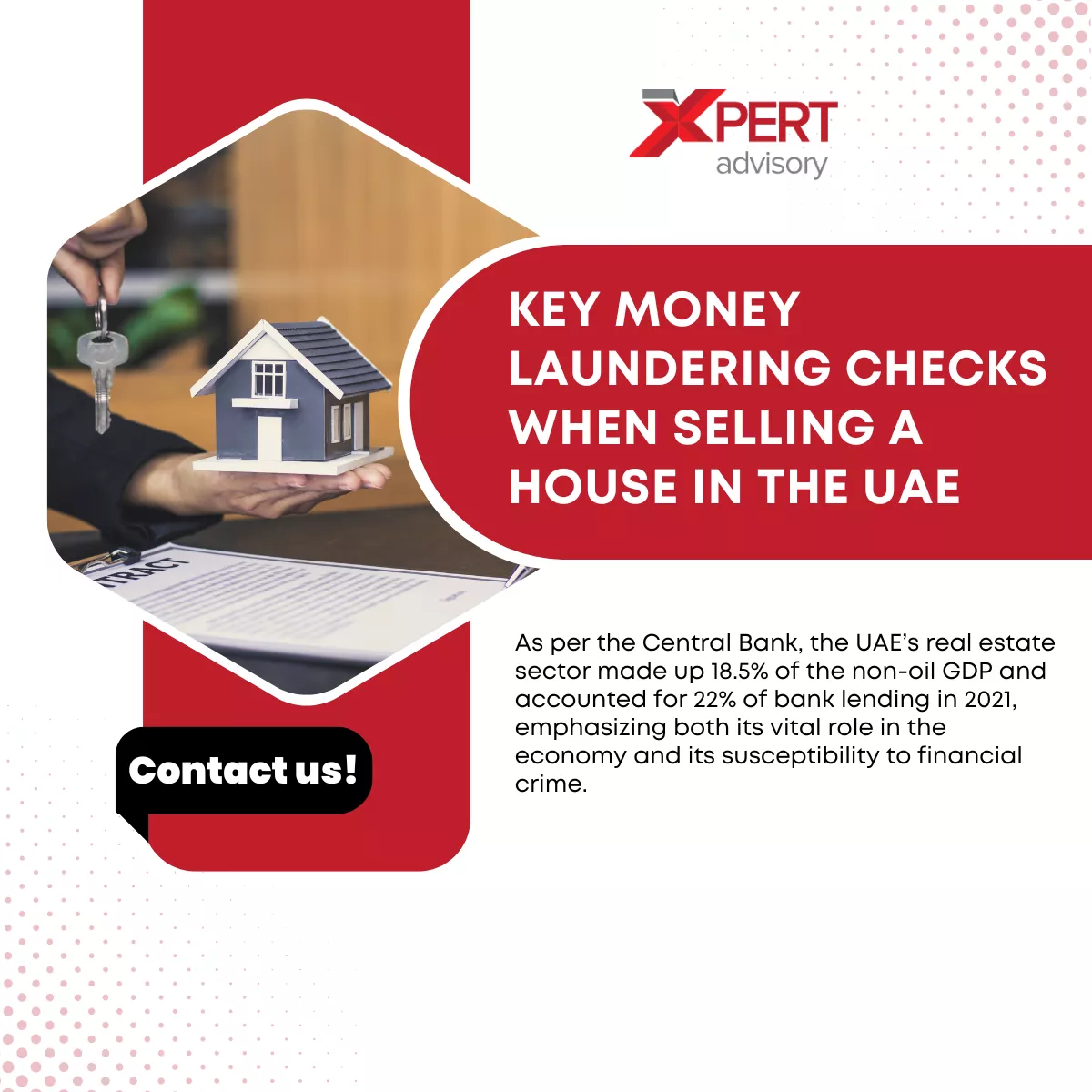The real estate sector is highly vulnerable to money laundering in the UAE, with criminals exploiting property transactions to disguise illicit funds. The UAE real estate sector, as reported by the Central Bank, contributed 18.5% to non-oil GDP and 22% of bank loans in 2021, highlighting its economic importance and financial crime vulnerability. To mitigate these risks, money laundering checks when selling a house in the UAE have become essential. This blog gives you insights into money laundering risks and how essential checks help mitigate them in UAE.
Money Laundering Risks When Selling a House

Real estate provides excellent conditions for criminals to launder money since it offers robust options to store and transfer substantial assets. There are essential risks which affect house sales in the UAE including:
High-Value Transactions
Real estate deals with substantial financial exchanges which makes them a desirable operation for cleansing criminal revenues. Illegal funds enter the legitimate financial system through the use of cash payments together with property flipping methods and fake price appraisals.
Cross-Border Transactions
Money launderers prefer the UAE real estate sector since the market draws significant foreign investment capital. The system allows criminals to transfer money between different nations through contrived legitimate real estate transactions.
Use of Intermediaries
Money laundering frequently occurs through the involvement of real estate professionals such as brokers and agents together with legal experts who might help such criminal activities without knowledge. Several middle entities involved in transactions make it difficult to identify the original fund provider.
Concealment of Ultimate Beneficial Owners (UBOs)
The true ownership of properties remains unknown because criminals employ nominee buyers together with shell companies and trusts for concealment purposes. Tracking illegal funds from their source becomes challenging due to this practice.
Anonymity and Privacy
The use of Powers of Attorney arrangements during certain transactions allows criminals to conceal their identities. Property // wrong link incorporated acquisitions completed with virtual assets have resulted in new obstacles for following illegal financial transactions.
Subjectivity Around Property Valuation
Money launderers manipulate property prices because it enables them to integrate funds obtained from criminal activities. The process of overpricing or underpricing properties becomes more difficult to track because criminals can justify these actions by using renovations.
Rapid Buying and Selling (Flipping)
Illegal funds are made untraceable by criminals who continuously purchase and resale properties at manipulated prices in order to establish multiple complex financial records.
Importance of Money Laundering Checks When Selling a House
Ensuring compliance with AML regulations is crucial when selling a house in the UAE to uphold the integrity of the real estate sector. The UAE functions as an international investment destination where property market attractiveness meets significant exposure to financial criminal activities. Real estate transactions serve as a common route for criminals to clean up illegal funds through techniques that include artificial property pricing, intermediary networks, offshore entities, and rapid property flipping to disguise the source of their money.
The UAE established robust legal controls for real estate transactions which require complete due diligence exams and detailed financial verification. The key regulations include:
- Federal Decree-Law No. 20 of 2018: It serves as the main Anti-Money Laundering legislation because it provides directives for preventing money laundering while fighting terrorist financing through sector-wide financial transparency measures for real estate operations.
- Cabinet Decision Number 10 of 2019: It creates DNFBP classifications that subject real estate agent and broker professions to Anti-Money Laundering compliance standards.
Real estate professionals are required to conduct risk assessments for their clients, validate client identification, and monitor financial operations in accordance with the regulations that have been implemented. They are required to inform the authorities of any suspicious activity they observe.
The UAE is distinguished as a trustworthy investment market by the reduction of financial crime risks and the establishment of market transparency, which is facilitated by the adherence to AML laws by real estate agents and sellers.
Key Money Laundering Checks When Selling a House in UAE
Ensuring compliance with Anti-Money Laundering (AML) regulations is crucial in UAE real estate transactions to protect illegal financial activities. Sellers, real estate agents and brokers must conduct rigorous due diligence to identify and mitigate money laundering risks. Here are the key money checks when selling a house in UAE:
Conduct a Risk Assessment
Any real estate transaction needs a thorough risk assessment to identify possible money laundering or terrorist financing threats. This includes the following points:
- Real estate sales in the UAE require identification of high-risk customers who may include factors from high-risk jurisdictions as well as Politically Exposed Persons (PEPs).
- The assessment needs to examine both payment methods for costly deals and external financial accounts involved in the transaction.
- The evaluation of property location and price and buyer characteristics helps spot odd activities.
- The company should apply risk-based due diligence practices for transactions with elevated risk levels to receive increased examination.
Verify the Identity of All Parties
All parties involved in the transaction should undergo verification of their identities. The prevention of fraud and establishment of transparency requires validating the personal details of every party who takes part in the transaction. This requires following point:
- Legitimate identification proof including Emirates ID together with passport and residency visa from all parties responsible for the deal is required.
- The way to verify official company information applies to legal entities that participate in the transaction.
- When corporate structures or trusts are in use it becomes essential to identify the person who holds the ultimate ownership position known as the ultimate beneficial owner.
- The buyer’s identification established through the verification process must match exactly with the described financial status and funding sources.
Screen Against Sanctions Lists
UAE and international sanctions listings must be used to check that every person or organization engaging in the sale is free from financial wrongdoings.
- The financial institution performs sanction examinations through information databases provided by UAE Financial Intelligence Unit (FIU) and United Nations (UN) and Financial Action Task Force (FATF) and the Office of Foreign Assets Control (OFAC).
- The identification process of restricted persons should block all transactions pertaining to banned individuals or high-risk jurisdictional entities.
- Complete documentation about the screening operations must be kept for audit investigations and compliance verification.
Verify the Source of Funds

AML compliance demands the thorough verification of legitimately sourced funds from buyers. Real estate professionals must ensure the following:
- Bank statements and salary slips and tax records need to be requested as proof of income origin together with tax records.
- Professional analysts must look into sizable or bizarre deposits as well as offshore deals and payments from third parties.
- Real estate professionals should investigate people who make most of their payments in cash since these transactions could indicate money laundering activities.
- Professionals should conduct analysis of financial transactions when they touch high-risk countries with weak AML protocols.
Monitor Transaction Patterns
Money laundering activity signals itself through irregular transaction behavior. Red flags include:
- Large cash transactions without an obvious source or justification.
- The quick resale of properties multiple times at various markets produces inflated and deflated cost valuations.
- The people in charge of ownership use multiple middlemen together with complex legal methods to hide their actual stake.
- Third-party payments made through offshore transactions can be considered suspicious unless the business provides proper grounds.
Report Suspicious Transactions
Every discovery of suspicious conduct or abnormal financial activity requires immediate reporting to authorities through the submission of a Suspicious Transaction Report (STR) or Suspicious Activity Report (SAR) to the UAE Financial Intelligence Unit (FIU).
- All transaction information which matters regarding parties involved should be documented along with financial movement and risk elements.
- AML compliance officers together with legal advisors should manage STR reporting procedures by following secure and prompt submission requirements.
- All records must be kept for UAE FIU audits and regulatory probes.
- Non-reporting of suspicious transactions leads to legal penalties together with substantial fines and a possible business license suspension.
Benefits of Money Laundering Checks in UAE
Anti-Money Laundering (AML) compliance checks for house sales in the UAE create several advantages, protecting sellers, property reports, and the real estate market from illegal practices. The following explanation demonstrates why property transaction stakeholders need money laundering checks:
Prevents Financial Crimes
Real estate sellers together with professionals can stop criminal fund launderers from acquiring property through AML checks. The UAE economy remains protected from illegal funds through such disruption of money laundering networks.
Ensures Compliance with UAE Laws
Real estate transactions in the United Arab Emirates need to be monitored per Federal Decree-Law No. 20 of 2018 and Cabinet Decision No. 10 of 2019 which implement strict Anti-Money Laundering regulations in the country. The laws protect property sellers from both financial penalties along with legal consequences.
Protects the Reputation of the Seller
The real estate market sector together with sellers benefit from the preservation of their reputation through AML checks. AML checks protect sellers from committing activities with criminals and fraudulent buyers without their knowledge. Market integrity remains protected when AML checks are performed which reduces damage to real estate professional reputation and generates trust in legitimate investors.
Prevents Legal and Financial Liabilities
A real estate seller who fails to meet AML regulations will face substantial financial penalties in addition to legal consequences including business preventions. As sellers conduct proper financial and identity verification on buyers they minimize their risk of participating in unlawful activities as well as meeting UAE legal requirements.
Enhances Market Transparency and Stability
Real estate markets with transparent and regulated systems lead genuine investors to enter the market yet drive away financial criminal actors. AML checks contribute to maintaining stable market conditions thus retaining real estate as an enduring profitable investment option.
Ensures Secure and Legitimate Transactions

The combination of source fund verification with thorough buyer assessment allows sellers to validate that financial transactions stay properly licensed and free from unlawful operations. The implementation of this system blocks both false claim schemes as well as payment defaults that would otherwise result in financial losses.
Strengthens International Trust and Compliance
Strict anti-money laundering regulations establish a global standard of financial compliance for the UAE real estate market. The country obtains improved status as a secure investment place because of its regulatory and transparent property market which attracts foreign investors.
Conclusion
Ensuring a secure house sale in the UAE requires money laundering checks when selling a house in UAE to uphold legal compliance and maintain transparency. The real estate sector remains exposed to financial criminal activities which forces sellers and their agents and brokers to perform identity verification alongside fund legitimacy assessment before reporting questionable transactions. UAE real estate market gains expertise as a safe investment destination through the discussed essential measures that stop improper dealings while preserving market integrity. The AML compliance requirements followed by real estate professionals help create a managed property industry that builds economic expansion with guaranteed financial stability.
Do You Want to Ensure AML Compliance When Selling a House in the UAE? Stay compliant with Xpert Advisory’s specialized AML compliance consultancy services, designed to safeguard your property transaction from financial crime risks. We also provide KYC and due diligence services to verify buyers and prevent fraud. Contact us today and protect your property transaction.
FAQs
How Does Anti-Money Laundering Regulation Impact the Property Market?
The property sector can stay transparent because of Anti-money laundering regulations. Property sellers along with agents required to carry out identity and financial checks to stop unlawful property dealings.
How Do AML checks Help Prevent Money Laundering in Property Transactions?
AML checks function as verification procedures designed to stop criminals from cleaning their illegal assets through property deals. They involve the scrutiny of both buyers and sellers, using a risk-based approach to confirm that funds stem from legitimate sources through their evaluation process.
Are Sellers Subject to the Same Level of Scrutiny as Buyers in AML Checks?
While buyers often undergo more extensive scrutiny due to the origin of the purchase funds, sellers are also subject to AML checks. This includes verifying their identity and confirming ownership of the property to prevent fraudulent transactions.


